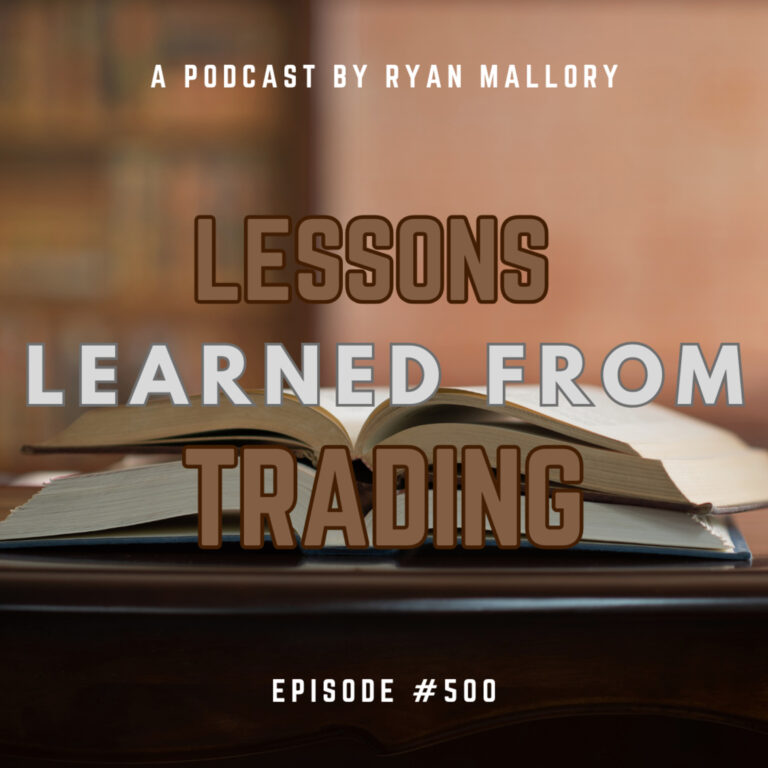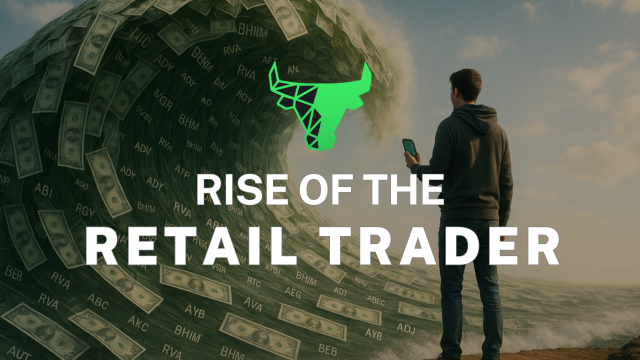Episode Overview
Is it worth trying out a robo advisor, or using a financial advisor? In this podcast episode, Ryan explains his opinions on this topic, and why they aren’t as good or savvy about the stock market that they make themselves out to be. Also, Ryan tackles the topic of having multiple portfolios and why it is important as a trader to separate your various strategies.
Available on: Apple Podcasts | Spotify | Amazon | YouTube
Episode Highlights & Timestamps
- [0:07] Robo Advisors and Portfolio Overload
Ryan opens with an email from a listener named Cletus who has four separate investment accounts, including robo-managed accounts. Ryan outlines the episode’s focus on the viability of robo advisors and managing multiple portfolios. - [1:33] Breaking Down Robo Advisors
He explains how robo advisors work, what their inputs are based on, and the potential risks of relying too heavily on them. - [6:30] Criticism of Financial Advisors
Ryan shares his skepticism toward most financial advisors, emphasizing their business model and perceived lack of personalized care. - [10:43] Portfolio Segmentation Strategies
He offers his thoughts on organizing different accounts for specific purposes like dividends, swing trading, and long-term investments to avoid emotional interference. - [15:22] Importance of Account Separation
Ryan stresses how combining different strategies in one account can blur objectives and decision-making, ultimately hurting performance.
Key Takeaways from This Episode:
- Robo Advisors Lack Transparency: They rely on black-box algorithms that aren’t superior to self-managed strategies for those willing to learn.
- Financial Advisors Often Act as Salespeople: Many are more focused on gathering assets than managing them actively, and often don’t outperform basic index funds.
- Account Segmentation is Critical: Having separate accounts for swing trades, dividends, and long-term investments helps avoid emotional and strategic conflicts.
- Do It Yourself When Possible: No one cares more about your financial future than you do, making financial literacy and self-management valuable.
- Avoid Overcomplication: Spreading small amounts of money across too many accounts can dilute your focus and performance.
Resources & Links Mentioned:
- Swing Trading the Stock Market – Daily market analysis, trade setups, and insights by Ryan Mallory.
- Join the SharePlanner Trading Block – Get real-time trade alerts and community support.

Take the Next Step:
✅ Stay Connected: Subscribe to Ryan’s newsletter to get free access to Ryan’s Swing Trading Resource Library, along with receiving actionable swing trading strategies and risk management tips delivered straight to your inbox.
📈 Level Up Your Trading: Ready for structured training? Enroll in Ryan’s Swing Trading Mastery Course, The Self-Made Trader, and get the complete trading course, from the foundational elements of trading to advanced setups and profitable strategies.
📲 Join the Trading Community: Sign up for SharePlanner’s Trading Block to become part of Ryan’s swing-trading community, which includes all of Ryan’s real-time swing trades and live market analysis.
Full Episode Transcript
Click here to read the full transcript
0:07
Hey, I’m Ryan Mallory and this is my swing trading the stock market podcast. I’m here to teach you how to trade in a complex ever-changing, world of Finance, learn what it means to trade, profitably and consistently managing risk, avoiding the pitfalls of trading. And most importantly, to let those winners run wild, you can succeed at the stock market and I’m ready to show you how, hey, everybody, this is Ryan Mallory with swing trading the stock market.
0:33
In today’s episode is going to be about Out Robo, advisors also going to be about too many portfolios and your account. So we’re going to talk about a couple of topics here. The guy that wrote me here has asked me to call and Cletus for his Florida retina game, and I don’t know what it is about you guys, in the name cletis, but if there’s a Cletus that’s listening to this podcast on the regular, he’s probably wondering like, man, why every week, it seems like they’re dragging my name through the mud.
1:00
But hey, somebody wants to be called Cletus on. Who am I to say otherwise, right? So Cletus rights. Ryan, let’s just call me Cletus. I’m here. Average new and experimenting investor. I have four portfolios. The first is an IRA that I’ve had since 2004.
1:16
When I left a company and converted my 401k, I’m 65 years old, but have never withdrawn from it. I have let it ride the roller coaster ever. Since it’s gone from the lows of 13,000 dollars in value to as high as 45 thousand dollars in value. I have recently converted it to a robo account.
1:33
What do you think about Robos by the Way. I opened another regular Robo stock account with a few thousand dollars. I transferred out of my savings account. So these I do not manage the other two re trade accounts with a few hundred dollars in a stash portion type account with a few hundred dollars, which I have been trying to learn how to swing trade with.
1:51
Is this too many accounts for someone and experienced like me? Sincerely Cletus. All right, we’re going to talk about Robo advisors. I don’t think I’ve ever talked about them on here before and we’re going to talk about having too many. Folios, I have multiple portfolios and will dig into that in a little bit.
2:08
But first, what am I drinking? I have got me wolf, burn Aurora, single malt, scotch whiskey, it’s 46 percent alcohol, 92 proof, and it’s kind of like a golden yellowish color here. It’s nothing too exciting on that front. But man, I can smell this thing from almost across the room when I poured it.
2:28
And I was, I smell his raisins like the ones that you ate when you’re in elementary school. For some of you guys who go back, 20, 30 years, Since you’ve been in grade school, you’ll know what I’m talking about. I don’t know if they still use these things anymore, maybe they do, but raisins in these little tiny cardboard, boxes managing those things would always be stuck in the corners and you have to be getting them out because your mom put them in yours school lunch.
2:48
I don’t like them things, I hated them, but if you opened up both ends of it, you could actually make them whistle, but that’s what it smells like. It takes me back to that time. When I was getting raisins packed in my school lunch. And I got to tell you, that’s not one of those things that was very nostalgic tasting, those freaking raisins.
3:04
I hated those things. So this thing is already off to a bad start, right? And then there’s a lot of like vanilla and Licorice and not a huge fan of the licorice. Vanilla I can do with. I think it’s kind of like and most of the bourbons and Whiskey’s that I try and then there’s a little bit of spice there at the end but it kind of like leaves you really dry in the mouth.
3:25
It’s almost like you just took a handful of almonds. Threw him in your mouth and you’re now you’re just trying to chew them up without anything to wash it down with. That’s kind of how this one comes across. I would give it. On a scale of one to ten. Oh. And by the way, the floral flavors in this thing, I just got a whiff of it.
3:40
Floral flavors are not good man, I don’t think they’re good in anything. Especially whiskey bourbon, Rye Scotch, whatever it is, it doesn’t taste good in. This is got a strong stench of Floral in it. On a scale of 1 to 10 I’m going to give it a 4 1.
3:56
I don’t like this stuff. I don’t like it at all. Definitely didn’t like picking up that flavor of floral at the end. Wolfburn Aurora single malt whiskey. Not good. All right, back to Cletus and his questions here. So for those who don’t know what a robo advisor is, and I did some more digging around and I tried out some of the stuff that they have on robo advisors before I went and did this episode. But essentially it’s like an algorithm that’s based off of your needs, your desires, your goals financially, your age and it puts together like a portfolio of stocks, domestic stocks, foreign stocks, bonds and it bases it all off of the inputs that you give it.
4:35
So you know, if you were wanting to retire with a million dollars in the next 20 years, and you’re putting in two hundred thousand dollars in, it would give you a portfolio for what it thinks it can do. And then it I used the one on Fidelity just to look at what kind of stuff they’re going to give me it says if I put a hundred thousand dollars in, for instance, I could have 700,000 and something dollars by 2039 if it’s a very aggressive market that provides a good return. And on the low end, it would be somewhere around like three hundred thousand dollars if I was putting a thousand dollars in it a month. They give you a range, they give you what they kind of expect the median, and then they give you the highs and the lows.
5:11
Now it also asks you, all right, scale of 1 to 10, how risky do you want to be? If you’re 10, then it’s going to give you a more aggressive portfolio more in stocks and less in bonds. But here’s the thing. Those robo advisors, it’s not like it’s like this self-aware AI that has an understanding of the market that goes beyond human comprehension.
5:32
It’s really just as good as the people who are putting the inputs into it. And do we really even know who’s doing the inputs or what the inputs are? It’s probably proprietary in most cases. I doubt that they’re telling you what the inputs are, and it’s really just hands-off. And they’re charging you usually anywhere from like, you know, a couple of tenths of a percent to manage your account to maybe even a couple percentage points who knows?
5:52
But it’s hands-off. It’s based off of an algorithm. Is that really something that you want to be trusting your financial future to? For me, personally, no. And here’s the thing as well. No one’s going to care about your money as much as you. And we’re always so quick to go to a financial advisor and think that they’re the ones that are going to be able to help us and help us retire.
6:13
But what do financial advisors do for you? I mean, really they’re sales agents, right? And I know that there’s good financial advisors out there. I’m saying, by and large, most of them don’t know what they’re doing. Yes, they’ve taken their tests and everything else, but really, they’re just trying to get your money and then they’re going to move on to the next person and try to collect theirs. That’s why you see a lot of them at churches. You see a lot of them in organizations. They’re well involved in their community. Why? Because they want to get in. They want to be that guy that’s the financial advisor. That’s like, “Oh, you need a financial advisor? I know a guy.” And that’s why you see them so immersed in their communities because they’re trying to get as much money under their management as possible.
6:48
I always find it crazy in my mind when I hear about these financial advisors that are taking clients out in the middle of the day when the stock markets are open on a golf course trying to get their money. The stock market’s open, dude. Like, what are you doing? You’re definitely not managing money from a golf course. And yes, there’s times where I take days off.
7:05
But a lot of these financial advisors, they’re out and about. They’re trying to get that next client. They’re trying to get that next million dollars of money under their belt so that they can manage that money and skim the top off with like one or two percent in fees. And honestly, I can never see myself giving my money to a financial advisor because finances are not easy. Understanding the markets is not easy, but it’s doable. And nobody’s going to care about your money as much as you.
7:27
But we kind of think that it’s like this really complex topic that you’ve got to have somebody that’s a financial advisor to understand it, and it’s not. I met a financial advisor one time and he was just starting off. And I said, “Well, what’s your goal for your clients?” And he says, “Oh, I’m trying to get them the return of the S&P 500.” So I said, “Why would you not just tell them to…” this is what I told him “Why would you not just tell them to buy SPY?” And he’s like, “Well, I offer more than that.” I was like, “Well, what are you offering?” He couldn’t tell me. Because they’re really not offering you anything. They’re always proud of themselves when they match the returns of the market.
8:02
Well, why not just do SPY? You want to be a little bit more aggressive? Go with the Qs. I really don’t get the whole idea of financial advisors, and I definitely don’t get the whole notion of why people use robo advisors when you don’t even understand what the inputs are. They’re just telling you, based on their calculations and their algorithms and their formulas, that this is the allocation that we want to put you in.
8:18
We’ll spend three hours a night scrolling social media and Twitter and everything else, but we don’t have the time to go look at our finances. But we definitely want to know what Debbie Do-Good is doing down the street with her bridge club. If you don’t take your own finances seriously, don’t expect nobody else to.
8:37
And that’s why I always think it’s best for people to become financially literate. To take the reins for themselves. Don’t do it blindly. Don’t do it without doing your own due diligence. But my goodness. What most financial advisors provide is trash.
8:55
And then when you get a bad market like this year, last thing they want to do is talk to their clients. They definitely don’t want you to take your money somewhere else. If you’re going to do that, they’ll definitely talk to you and they’ll try to tell you how you need to stay and how they have all of these products and services that they can offer you. “Let me talk to you. Let me show you who can really help you.” I mean, it’s just maddening, that whole industry.
9:11
And how do they handle market crashes? They don’t. They’ll just tell you, “Oh, we think the market will recover at some point.” And they’re always getting information from the people that they work for. “Well, I’m being told that we’re going to probably bottom in the beginning of 2023, and then we’ll probably see steady growth throughout the end of the year.”
9:27
I remember in the beginning of the year when they were telling us we were going to be bottomed by this time, and maybe we are, but nobody knows that for sure at this point. And most people are just talking about how they think we’ll bottom in the spring of 2023, and if we haven’t bottomed by then, then they’ll just keep pushing those goalposts back further.
9:51
So whether it’s financial advisors or robo advisors, I’m not a big fan of them, and the robo advisors really scare me a lot. I would love to know how a lot of you guys are doing with robo advisors that are using them in this particular market. How do they react? How do they know that we’re in a bear market? Are they putting your money into cash? Probably not. They’re probably just letting you take the hits. And the more that we train ourselves and teach ourselves and apply it to ourselves, the better we can do it for ourselves because we’re not limited like a lot of these financial services are. We can buy what we want. We can sell when we want. So that’s my thought on robo advisors and financial advisors.
10:26
Now one thing that I would definitely say will help you out in your financial education is swingtradingthestockmarket.com. You’re going to get all of my stock market research each and every day. That’s going to be multiple videos. You’re going to get watch lists. You’re going to get the stocks that I’m looking at each morning. This is a really good service updates on the overall market, updates on all the big tech stocks. Really, really a good deal. And in the process, you’re supporting this podcast.
10:43
So check that out. swingtradingthestockmarket.com. Now, what about having too many portfolios? One of the cool things that you can do with a lot of your portfolios is just tie them together. Like for instance, Thinkorswim you can actually manage all of your Thinkorswim accounts through TD Ameritrade with just one login.
10:59
You just got to link them together. And that’s what I do a lot with my accounts. I link them all together so that I can flip right through them. I have accounts with others as well, and they offer the same things. Now, can you have too many? I think you get kind of spread out to where, okay, if you got like a hundred dollars in this account, a hundred dollars in that account, and Cletus has a little bit of that going on, that’s not going to be overly easy to make trades on individual stocks. Yes, brokerages like Fidelity they have fractional shares. That’s helpful.
11:17
But Cletus here, he’s also new and he’s still experimenting. So doing that with a low dollar amount like what he’s doing is much more recoverable than if he was trading like with his 45 thousand dollar retirement account and he’s just experimenting with it.
11:42
That could be pretty disastrous. But what I like to have and like I told you, I have multiple accounts I like to have an account for fixed income. That’s like your CDs, that’s like for your bonds. I also like to have an account for dividend plays. There’s a lot of good dividend plays out there right now tons of them.
11:59
Now you got to do the research for yourselves and make sure it’s something that’s right for you. But for me, for a long time now, I’ve been buying up stuff like Walgreens. I’ve been buying up some Kraft that’s KHC. I’ve been buying up some Intel when their stock just kept dropping and dropping and dropping.
12:14
That was a long-term investment that I wanted to have for really just the dividend. If it grows some, that’s great. But I’m just collecting on the dividend. Then there’s also like a long-term account. And what I like to do there is I don’t do a lot of investing in it all the time. What I do is I wait for big market corrections and I’ll have raised cash during the previous bull run.
12:36
And then when that market finally comes back down, I have all this cash at hand that I can just start deploying on stocks when they get really cheap. And of course, I have my swing trading account. So I love my swing trading account. I’m very active in that every day, obviously, because I’m a full-time trader. And there’s others. I mean, you can have crypto accounts, you can have options trading accounts, but no I mean, the more you get spread out, the more your money is spread out. So then it becomes a little bit more difficult to manage all of it.
12:59
But the one thing that I think is really important with the accounts is that if you’re swing trading in an account, don’t let what’s going on in your long-term investment account affect your swing trades. Because you can be short on the market on your swing trades and you’re making a lot of money there, but your long-term investments, they may be taking a hit there, right?
13:17
Those are your long-term investments. They’re not necessarily meant yes, you do close them out at some point but they’re not meant to be actively traded. And so if you have everything into one account, you have your long-term investments and you have your swing trades and you’re seeing it all real time play out, it’s going to affect your emotions.
13:35
You may be down overall, but you’re doing really good on your swing trading account. And really what’s going on with your long-term investments and your strategy for those dictates that you really shouldn’t be doing anything. But you feel that you should because you’re losing so much money in your overall account that despite making money in your swing trades to the short side, you’re letting what’s going on with your long-term investments affect your strategy, your approach to trading.
14:00
So it’s good to have them segregated. I have a friend that does not segregate them. And he’s constantly frustrated because he’s always trying to hedge his long-term investments with the swing trades. At least this year, when the market’s been going down, he’s been doing a lot of shorting. But really, what he needs to do is think about everything separately.
14:20
Long-term investments are for long-term investments, for buying and holding. Your dividends are for a while, collecting the divvies. And then your swing trades are for taking advantage of short-term price swings in either direction. But then it’s very difficult to be successful at your swing trading when you’re mixing that in with what’s going on with your long-term investments or thinking that you can’t get too long on your swing trading account because you’re already X amount of dollars long on your long-term investment.
14:44
So when you combine them all together, it gets really jumbled up and gets really confusing. And remember what I tell you guys all the time on this podcast the market doesn’t care about your circumstances, about your issues, about what accounts that you have, how much money you have in it, what your needs, what your desires are.
15:00
It’s just the market. It’s going up, it’s going down, it’s going sideways. And so our goal is to be as much aligned with just what the market’s doing as possible. And when we enter all these outside variables, when we start mixing up accounts, when we start feeling the emotions because we’re mixing our long-term accounts in with our swing trading accounts and it’s all just one pot of money, that starts to mess with our psyche.
15:22
So in the end, we got to make sure that our mind and our approach and our accounts, they’re aligned for the objective with trading. And we got to make sure that they’re aligned with the market. So swing trades short-term. The swings that you’re trying to take advantage of don’t get that water muddied with your long-term investments.
15:40
That should be in a separate account. Now again, none of this is financial advice. I just need to say that. None of this is financial advice. This is how I do it, and these are my beliefs. But I think it’s dangerous for me if I start muddying the waters by having my dividends and my long-term investments and my swing trades all fighting for my attention in a manner in which I got to make one decision that benefits all of them.
16:02
I got to make some kind of like a swing trade that’s going to hedge my long-term, but not taking away from the divvies that I’m collecting over in my dividend account. You see how it can get really confusing? And it almost gets confusing for me to have to do this podcast episode just talking about it. But to summarize, can you have too many accounts?
16:19
I don’t think you want to spread yourself out too thin where you only have a couple hundred dollars in like multiple accounts, right? But I do think that different approaches to trading and investing should be segregated into different accounts. And when it comes to robo advisors and financial advisors do I like them? None of them.
16:34
I’ve never met one that I liked in terms of financial advisors. I’ve never met a robo advisor because it’s just an algorithm. I don’t like them either. I know that everybody has different circumstances, but I don’t think that they’re offering you something that you can’t ultimately do for yourself.
16:51
If the guy who says, “Hey, I’m just going to give you the return of the S&P 500,” then great. You can pretty much achieve the same thing by buying and holding SPY. Because remember, at the end, nobody’s going to care about your money as much as you. Financial advisors they’re just trying to get as many people’s accounts under them so that they can collect more and more commissions each and every year.
17:08
If you liked this podcast, I would encourage you to leave me a five-star review. If you’re a financial advisor, you’re probably leaving me a one-star review, but whatever. And make sure to keep sending me your questions ryan@shareplanner.com and make sure to check out swingtradingthestockmarket.com. Thank you guys, and God bless.
17:23
Thanks for listening to my podcast, Swing Trading the Stock Market. I’d like to encourage you to join me in the SharePlanner Trading Block, where I navigate the stock market each day with traders from around the world. With your membership, you will get a 7-day trial and access to the trading room, including alerts via text, email, and WhatsApp.
17:39
So go ahead, sign up by going to shareplanner.com/tradingblock. That’s www.shareplanner.com/trading-block. And follow me on SharePlanner’s Twitter, Instagram, and Facebook, where I provide unique market and trading information every day. If you have any questions, please feel free to email me at ryan@shareplanner.com. All the best to you, and I look forward to chatting with you soon.
Enjoy this episode? Please leave a 5-star review and share your feedback! It helps others find the podcast and enables Ryan to produce more content that benefits the trading community.
Have a question or story to share? Email Ryan and your experience could be featured in an upcoming episode!
Become part of the Trading Block and get my trades, and learn how I manage them for consistent profits. With your subscription you will get my real-time trade setups via Discord and email, as well as become part of an incredibly helpful and knowledgeable community of traders to grow and learn with. If you’re not sure it is for you, don’t worry, because you get a Free 7-Day Trial. So Sign Up Today!

Welcome to Swing Trading the Stock Market Podcast!
I want you to become a better trader, and you know what? You absolutely can!
Commit these three rules to memory and to your trading:
#1: Manage the RISK ALWAYS!
#2: Keep the Losses Small
#3: Do #1 & #2 and the profits will take care of themselves.
That’s right, successful swing-trading is about managing the risk, and with Swing Trading the Stock Market podcast, I encourage you to email me (ryan@shareplanner.com) your questions, and there’s a good chance I’ll make a future podcast out of your stock market related question.
In today's episode, at episode 500, I am diving into the lessons learned from trading over the last 100 episodes, because as traders we are evolving and always attempting to improve our skillset. So here is to episode 500, and to another 500 episodes of learning and developing as swing traders in the stock market!
Be sure to check out my Swing-Trading offering through SharePlanner that goes hand-in-hand with my podcast, offering all of the research, charts and technical analysis on the stock market and individual stocks, not to mention my personal watch-lists, reviews and regular updates on the most popular stocks, including the all-important big tech stocks. Check it out now at: https://www.shareplanner.com/premium-plans
📈 START SWING-TRADING WITH ME! 📈
Click here to subscribe: https://shareplanner.com/tradingblock
— — — — — — — — —
💻 STOCK MARKET TRAINING COURSES 💻
Click here for all of my training courses: https://www.shareplanner.com/trading-academy
– The A-Z of the Self-Made Trader –https://www.shareplanner.com/the-a-z-of-the-self-made-trader
– The Winning Watch-List — https://www.shareplanner.com/winning-watchlist
– Patterns to Profits — https://www.shareplanner.com/patterns-to-profits
– Get 1-on-1 Coaching — https://www.shareplanner.com/coaching
— — — — — — — — —
❤️ SUBSCRIBE TO MY YOUTUBE CHANNEL 📺
Click here to subscribe: https://www.youtube.com/shareplanner?sub_confirmation=1
🎧 LISTEN TO MY PODCAST 🎵
Click here to listen to my podcast: https://open.spotify.com/show/5Nn7MhTB9HJSyQ0C6bMKXI
— — — — — — — — —
💰 FREE RESOURCES 💰
— — — — — — — — —
🛠 TOOLS OF THE TRADE 🛠
Software I use (TC2000): https://bit.ly/2HBdnBm
— — — — — — — — —
📱 FOLLOW SHAREPLANNER ON SOCIAL MEDIA 📱
*Disclaimer: Ryan Mallory is not a financial adviser and this podcast is for entertainment purposes only. Consult your financial adviser before making any decisions.





